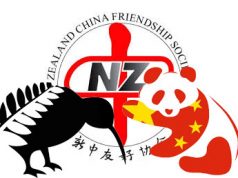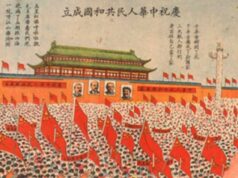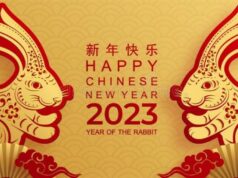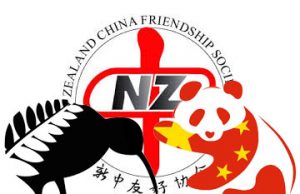The 60th Anniversary Tour:
the Silk Road and so much more…
~ Next meeting: 30 November ~
The full pdf of this newsletter is available at: NZCFSNelsonNovember2012.pdf
A tour group of 16, led by NZCFS Vice President Dave Bromwich, enjoyed four weeks in China in September. Among them were Nelson Branch members Chris Mouter, and Christine and Bruce Ward who will all share some of their exciting adventure with us.
The tour included a number of wonderful celebrations: 70 years since Rewi Alley and George Hogg set up the Shandan Bailie School, 40 years of New Zealand’s diplomatic relations with the People’s Republic of China, and 60 years since the New Zealand China Friendship Society had its first meetings in Auckland. These milestones meant that there were plenty of highlights, banquets and important official events.
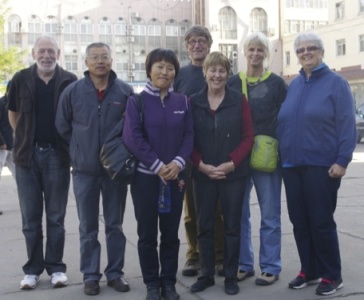 It was the first time on the Silk Road for Chris, Christine and Bruce but, having been to China several times, starting in the 1980s, they became fascinated by the surge of development and transformation in ‘rural China’.
It was the first time on the Silk Road for Chris, Christine and Bruce but, having been to China several times, starting in the 1980s, they became fascinated by the surge of development and transformation in ‘rural China’.
A particularly pleasurable highlight was meeting up with our Nelson connections, Ferry van Mansum and Aukje Both, and Li Pei and Liu Guozhong, in Shandan.
As usual, we will begin with a brief general meeting at 5.30 p.m. and then enjoy our meal from the Nelson Oriental, including vegetarian options, at 6 p.m. ($12).
Our speakers will begin about 7 p.m. Friends and visitors are most welcome but please notify Barbara when you ring so that we have accurate numbers for the meal.
Friday 30 November .. Hearing House .. 5:30 pm
To arrange catering please ring:
Barbara Markland Ph. 544 4712 by Tuesday 27 November
or e-mail Barbara: [email protected]
LAST MEETING: It was a great privilege to be able to bring Les Molloy over from Wellington and to hear and see his presentation on “The Natural World Heritage Sites of China”. There are nine of these sites in China and Les has been involved in exploring and evaluating them for inclusion in the UNESCO list. Les transported us all there through his beautiful photos and discussed the importance of each area.
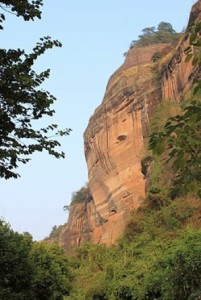 While some like Taishan, Huangshan, Emeishan, Huanglong, Jiuzhaigou, the South China Karst and the Sichuan Panda Sanctuaries are well known, it was particularly fascinating to hear about some of the others: The Three Parallel Rivers of Yunnan, where 220,000 plants, including rhododendrons and azaleas, were discovered by botanists in the 19th Century, and three major rivers, that finish up in the sea so far apart, run through three stunning, parallel valleys; the Chengjiang Fossil Site in Yunnan where fossils dating from 525 million years ago occur in a section of mudstone fifty metres deep; Sanqingshan that includes a blend of lush vegetation with extraordinary granite rock formations; and China Danxia with its unique landscapes formed from red sandstone and characterised by steep cliffs.
While some like Taishan, Huangshan, Emeishan, Huanglong, Jiuzhaigou, the South China Karst and the Sichuan Panda Sanctuaries are well known, it was particularly fascinating to hear about some of the others: The Three Parallel Rivers of Yunnan, where 220,000 plants, including rhododendrons and azaleas, were discovered by botanists in the 19th Century, and three major rivers, that finish up in the sea so far apart, run through three stunning, parallel valleys; the Chengjiang Fossil Site in Yunnan where fossils dating from 525 million years ago occur in a section of mudstone fifty metres deep; Sanqingshan that includes a blend of lush vegetation with extraordinary granite rock formations; and China Danxia with its unique landscapes formed from red sandstone and characterised by steep cliffs.
Les finished with an introduction to other possible World Heritage sites in China. So many places to visit!
APPO HOCTON SCHOLARSHIP: In March, your Committee suggested to NMIT the possibility of a scholarship to assist someone from our sister city, Huangshi, to study in Nelson. It was suggested that it could be named the Appo Hocton Scholarship, in honour of the Nelson pioneer who became the first naturalised Chinese in New Zealand.
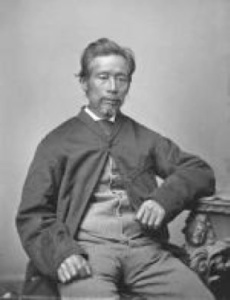 The idea was taken up by NMIT, and a scholarship was announced in Huangshi. It appears that the scholarship will first be awarded next year to a student coming to Nelson for the Art and Media course that is to be run in conjunction with the Hubei Polytechnic University, Huangshi.
The idea was taken up by NMIT, and a scholarship was announced in Huangshi. It appears that the scholarship will first be awarded next year to a student coming to Nelson for the Art and Media course that is to be run in conjunction with the Hubei Polytechnic University, Huangshi.
Most of the value of the scholarship is to be provided by NMIT in remitting international fees, but we have set aside $1,000 to assist with the expenses of the person holding the scholarship. We may also be able to provide extra value during their tenure in other friendly ways.
The Nelson City Council and the Economic Development Agency may also be involved in the scholarship but their roles are yet to be determined.
CHINESE STUDENTS AND SCHOLARS ASSOCIATION: A ceremony is being held at NMIT on Monday 26 November to announce the formation of a Chinese Students and Scholars Association. The Chinese Consul General, Madam Tan Xiutian, will be up from Christchurch for the occasion and our Branch will be represented. We look forward to exploring ways we can work together to assist the many Chinese students coming to study in Nelson.
DELEGATION TO HUANGSHI: Planning is underway for a ‘Friendship Delegation’ to visit Huangshi in October, 2013. This would probably be for 5 nights during the second week of October.
Protocol dictates that up to 8 people can join such a delegation and so expressions of interest are invited from Branch members. Delegates will need to pay their own fares to China but accommodation, meals and transport for the time in Huangshi will be met by the Huangshi Municipal Government. The Principal of Nelson College for Girls is likely to be one member and it is hoped that someone from the hospital will participate as well.
If you are interested please contact Barbara Markland (ph 544 4712 or email [email protected]) or speak to her at the branch meeting.
NZCFS YOUTH INTERNSHIP: The NZCFS has established a $5,000 “NZCFS Youth Internship” that is open to young New Zealanders wishing to engage in a self-directed and in-depth project in China. The successful applicants may participate in voluntary community projects, help establish youth partnerships in China for ongoing relationships and future exchange, or be involved in some specific cultural learning. At the end of their internship, it is hoped that the applicant can identify or suggest a future youth exchange and friendship activity.
This youth internship is not aimed at scholarships for Chinese language study, or youth exchange which may be provided through other channels. Rather, it offers a complementary opportunity to engage deeply in Chinese society in line with a NZCFS strength: “building new friendships on solid foundations”.
For further information about the internship, please visit our website at https://nzchinasociety.org.nz or contact Dave Bromwich at [email protected] or 06 877 9930. Applications are due by January 20, 2013. Please advertise this to anyone you think might be interested.
CHINESE NEW YEAR BANQUET 2013: The Eastern Cuisine in Richmond is booked for our wonderful Chinese New Year Banquet on Sunday 10 February. Put this date in your diary now and we will look forward to seeing you there for another delightful evening of food and fun.
The Golden Hour
– Aukje Both & Ferry van Mansum
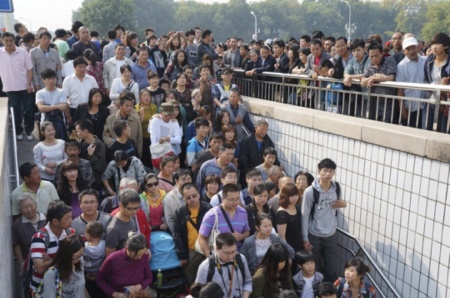 When you go to China you know that, apart from you and other foreign tourists, there will be around 1.3 billion Chinese in the country. So you have to expect queues and crowds and few quiet places, especially during holidays. Tourism is a part of China that is under development. Areas of natural beauty and those of cultural or historic importance are all given a rating, with AAAAA spots being the best and therefore the busiest. Wide approach roads, spanned by huge colourful Chinese gates, lead to enormous car parks where tour buses unload their passengers who will follow the flag of their portable microphone-wearing tour guide. Once past the ticket checkpoint, soothing music coming from artificial rocks will lead you to an electric buggy that will take you the last few hundred metres to your destination.
When you go to China you know that, apart from you and other foreign tourists, there will be around 1.3 billion Chinese in the country. So you have to expect queues and crowds and few quiet places, especially during holidays. Tourism is a part of China that is under development. Areas of natural beauty and those of cultural or historic importance are all given a rating, with AAAAA spots being the best and therefore the busiest. Wide approach roads, spanned by huge colourful Chinese gates, lead to enormous car parks where tour buses unload their passengers who will follow the flag of their portable microphone-wearing tour guide. Once past the ticket checkpoint, soothing music coming from artificial rocks will lead you to an electric buggy that will take you the last few hundred metres to your destination.
 The trick to avoid the crowds is to walk the last bit if it is not too far, even though hustling English-speaking tour guides might tell you that you will not be able to find the entrance yourself. Then go at your own pace, turn a few corners and you might find yourself almost alone, taking in the sights. Going to one of the less famous places will also guarantee you a more private holiday experience. Avoiding Chinese holiday season is another way to ensure you can take photos without the ever-posing Chinese tourist in front of the attraction. Getting to a place early does not always work because Chinese are early risers.
The trick to avoid the crowds is to walk the last bit if it is not too far, even though hustling English-speaking tour guides might tell you that you will not be able to find the entrance yourself. Then go at your own pace, turn a few corners and you might find yourself almost alone, taking in the sights. Going to one of the less famous places will also guarantee you a more private holiday experience. Avoiding Chinese holiday season is another way to ensure you can take photos without the ever-posing Chinese tourist in front of the attraction. Getting to a place early does not always work because Chinese are early risers.
A much better chance for some peace, space and quiet is to visit places at the “golden hour”, the time that most Chinese prefer to spend with their eyes closed. Lunch is at 12 sharp, and immediately after that, until about two o’clock, life slows down for the Chinese. If they are not at home, anything will do as a place to take a nap. In shops you see staff on make-shift beds in the back, or slumped over the counter, using their arms as a pillow, no doubt the most junior amongst them the unlucky one to attend to the few that do not need, or want, to take a time-out in the middle of the day. Restaurant staff curl up on the chairs under the tables after the last customers have finished their lunch and it is hard to find a bench in the park in Summer without someone stretched out on it.
 The afternoon nap: our students do it, our Chinese colleagues do it, truck drivers and even policemen in the street do it. It seems we are just about the only people in China who still don’t and it is hard to explain why this is not a custom in New Zealand or Europe. “How can you concentrate on your study, or work in the afternoon, if you don’t sleep for an hour or so after lunch?” is a question we are often asked.
The afternoon nap: our students do it, our Chinese colleagues do it, truck drivers and even policemen in the street do it. It seems we are just about the only people in China who still don’t and it is hard to explain why this is not a custom in New Zealand or Europe. “How can you concentrate on your study, or work in the afternoon, if you don’t sleep for an hour or so after lunch?” is a question we are often asked.
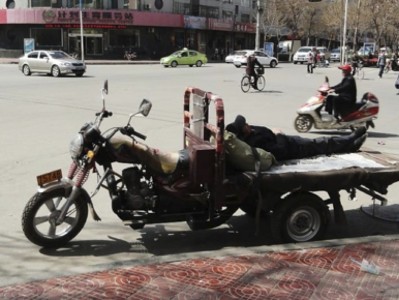 Of course we don’t have a two and a half hour lunch break and we want our classes to be over shortly after three o’clock but, even so, we think there are few students back home who would list “sleeping” as one of the things they do in their leisure-time, unless it is sleeping in late in the weekend or holidays. However, in a lesson we taught around free-time last week, many of our Chinese students ranked it as one of their favourite “activities” and all agreed that this is what most Chinese people like to “ do”.
Of course we don’t have a two and a half hour lunch break and we want our classes to be over shortly after three o’clock but, even so, we think there are few students back home who would list “sleeping” as one of the things they do in their leisure-time, unless it is sleeping in late in the weekend or holidays. However, in a lesson we taught around free-time last week, many of our Chinese students ranked it as one of their favourite “activities” and all agreed that this is what most Chinese people like to “ do”.
So, if you are in China and really like to be active, in the real sense of the word, eat before twelve, or well after, and plan your sight-seeing or shopping during those golden hours.


